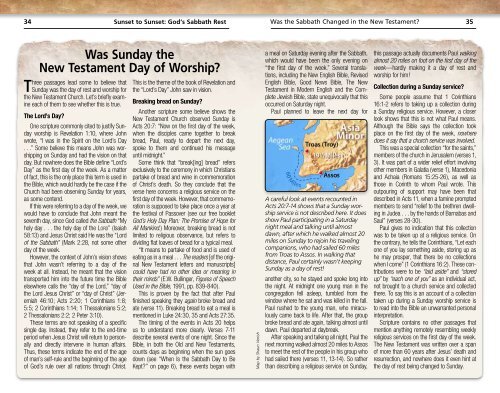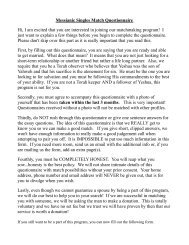Sunset to Sunset: God's Sabbath Rest - Messianic Singles Home
Sunset to Sunset: God's Sabbath Rest - Messianic Singles Home
Sunset to Sunset: God's Sabbath Rest - Messianic Singles Home
Create successful ePaper yourself
Turn your PDF publications into a flip-book with our unique Google optimized e-Paper software.
34 <strong>Sunset</strong> <strong>to</strong> <strong>Sunset</strong>: God’s <strong>Sabbath</strong> <strong>Rest</strong> Was the <strong>Sabbath</strong> Changed in the New Testament?<br />
35<br />
Was Sunday the<br />
New Testament Day of Worship?<br />
Three passages lead some <strong>to</strong> believe that<br />
Sunday was the day of rest and worship for<br />
the New Testament Church. Let’s briefly examine<br />
each of them <strong>to</strong> see whether this is true.<br />
The Lord’s Day?<br />
One scripture commonly cited <strong>to</strong> justify Sunday<br />
worship is Revelation 1:10, where John<br />
wrote, “I was in the Spirit on the Lord’s Day<br />
. . .” Some believe this means John was worshipping<br />
on Sunday and had the vision on that<br />
day. But nowhere does the Bible define “Lord’s<br />
Day” as the first day of the week. As a matter<br />
of fact, this is the only place this term is used in<br />
the Bible, which would hardly be the case if the<br />
Church had been observing Sunday for years,<br />
as some contend.<br />
If this were referring <strong>to</strong> a day of the week, we<br />
would have <strong>to</strong> conclude that John meant the<br />
seventh day, since God called the <strong>Sabbath</strong> “My<br />
holy day . . . the holy day of the Lord” (Isaiah<br />
58:13) and Jesus Christ said He was the “Lord<br />
of the <strong>Sabbath</strong>” (Mark 2:28, not some other<br />
day of the week.<br />
However, the context of John’s vision shows<br />
that John wasn’t referring <strong>to</strong> a day of the<br />
week at all. Instead, he meant that the vision<br />
transported him in<strong>to</strong> the future time the Bible<br />
elsewhere calls the “day of the Lord,” “day of<br />
the Lord Jesus Christ” or “day of Christ” (Jeremiah<br />
46:10; Acts 2:20; 1 Corinthians 1:8;<br />
5:5; 2 Corinthians 1:14; 1 Thessalonians 5:2;<br />
2 Thessalonians 2:2; 2 Peter 3:10).<br />
These terms are not speaking of a specific<br />
single day. Instead, they refer <strong>to</strong> the end-time<br />
period when Jesus Christ will return <strong>to</strong> personally<br />
and directly intervene in human affairs.<br />
Thus, these terms indicate the end of the age<br />
of man’s self-rule and the beginning of the age<br />
of God’s rule over all nations through Christ.<br />
This is the theme of the book of Revelation and<br />
the “Lord’s Day” John saw in vision.<br />
Breaking bread on Sunday?<br />
Another scripture some believe shows the<br />
New Testament Church observed Sunday is<br />
Acts 20:7: “Now on the first day of the week,<br />
when the disciples came <strong>to</strong>gether <strong>to</strong> break<br />
bread, Paul, ready <strong>to</strong> depart the next day,<br />
spoke <strong>to</strong> them and continued his message<br />
until midnight.”<br />
Some think that “break[ing] bread” refers<br />
exclusively <strong>to</strong> the ceremony in which Christians<br />
partake of bread and wine in commemoration<br />
of Christ’s death. So they conclude that the<br />
verse here concerns a religious service on the<br />
first day of the week. However, that commemoration<br />
is supposed <strong>to</strong> take place once a year at<br />
the festival of Passover (see our free booklet<br />
God’s Holy Day Plan: The Promise of Hope for<br />
All Mankind.) Moreover, breaking bread is not<br />
limited <strong>to</strong> religious observance, but refers <strong>to</strong><br />
dividing flat loaves of bread for a typical meal.<br />
“It means <strong>to</strong> partake of food and is used of<br />
eating as in a meal . . . The readers [of the original<br />
New Testament letters and manuscripts]<br />
could have had no other idea or meaning in<br />
their minds” (E.W. Bullinger, Figures of Speech<br />
Used in the Bible, 1991, pp. 839-840).<br />
This is proven by the fact that after Paul<br />
finished speaking they again broke bread and<br />
ate (verse 11). Breaking bread <strong>to</strong> eat a meal is<br />
mentioned in Luke 24:30, 35 and Acts 27:35.<br />
The timing of the events in Acts 20 helps<br />
us <strong>to</strong> understand more clearly. Verses 7-11<br />
describe several events of one night. Since the<br />
Bible, in both the Old and New Testaments,<br />
counts days as beginning when the sun goes<br />
down (see “When Is the <strong>Sabbath</strong> Day <strong>to</strong> Be<br />
Kept?” on page 6), these events began with<br />
Map by Shaun Venish<br />
a meal on Saturday evening after the <strong>Sabbath</strong>,<br />
which would have been the only evening on<br />
“the first day of the week.” Several translations,<br />
including the New English Bible, Revised<br />
English Bible, Good News Bible, The New<br />
Testament in Modern English and the Complete<br />
Jewish Bible, state unequivocally that this<br />
occurred on Saturday night.<br />
Paul planned <strong>to</strong> leave the next day for<br />
A careful look at events recounted in<br />
Acts 20:7-14 shows that a Sunday worship<br />
service is not described here. It does<br />
show Paul participating in a Saturday<br />
night meal and talking until almost<br />
dawn, after which he walked almost 20<br />
miles on Sunday <strong>to</strong> rejoin his traveling<br />
companions, who had sailed 60 miles<br />
from Troas <strong>to</strong> Assos. In walking that<br />
distance, Paul certainly wasn’t keeping<br />
Sunday as a day of rest!<br />
another city, so he stayed and spoke long in<strong>to</strong><br />
the night. At midnight one young man in the<br />
congregation fell asleep, tumbled from the<br />
window where he sat and was killed in the fall.<br />
Paul rushed <strong>to</strong> the young man, who miraculously<br />
came back <strong>to</strong> life. After that, the group<br />
broke bread and ate again, talking almost until<br />
dawn. Paul departed at daybreak.<br />
After speaking and talking all night, Paul the<br />
next morning walked almost 20 miles <strong>to</strong> Assos<br />
<strong>to</strong> meet the rest of the people in his group who<br />
had sailed there (verses 11, 13-14). So rather<br />
than describing a religious service on Sunday,<br />
this passage actually documents Paul walking<br />
almost 20 miles on foot on the first day of the<br />
week—hardly making it a day of rest and<br />
worship for him!<br />
Collection during a Sunday service?<br />
Some people assume that 1 Corinthians<br />
16:1-2 refers <strong>to</strong> taking up a collection during<br />
a Sunday religious service. However, a closer<br />
look shows that this is not what Paul means.<br />
Although the Bible says the collection <strong>to</strong>ok<br />
place on the first day of the week, nowhere<br />
does it say that a church service was involved.<br />
This was a special collection “for the saints,”<br />
members of the church in Jerusalem (verses 1,<br />
3). It was part of a wider relief effort involving<br />
other members in Galatia (verse 1), Macedonia<br />
and Achaia (Romans 15:25-26), as well as<br />
those in Corinth <strong>to</strong> whom Paul wrote. This<br />
outpouring of support may have been that<br />
described in Acts 11, when a famine prompted<br />
members <strong>to</strong> send “relief <strong>to</strong> the brethren dwelling<br />
in Judea . . . by the hands of Barnabas and<br />
Saul” (verses 28-30).<br />
Paul gives no indication that this collection<br />
was <strong>to</strong> be taken up at a religious service. On<br />
the contrary, he tells the Corinthians, “Let each<br />
one of you lay something aside, s<strong>to</strong>ring up as<br />
he may prosper, that there be no collections<br />
when I come” (1 Corinthians 16:2). These contributions<br />
were <strong>to</strong> be “laid aside” and “s<strong>to</strong>red<br />
up” by “each one of you” as an individual act,<br />
not brought <strong>to</strong> a church service and collected<br />
there. To say this is an account of a collection<br />
taken up during a Sunday worship service is<br />
<strong>to</strong> read in<strong>to</strong> the Bible an unwarranted personal<br />
interpretation.<br />
Scripture contains no other passages that<br />
mention anything remotely resembling weekly<br />
religious services on the first day of the week.<br />
The New Testament was written over a span<br />
of more than 60 years after Jesus’ death and<br />
resurrection, and nowhere does it even hint at<br />
the day of rest being changed <strong>to</strong> Sunday.



